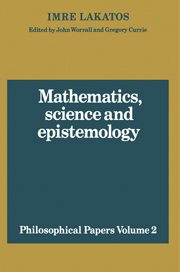Book contents
- Frontmatter
- Contents
- Editors' introduction
- PART 1 PHILOSOPHY OF MATHEMATICS
- PART 2 CRITICAL PAPERS
- PART 3 SCIENCE AND EDUCATION
- 12 A letter to the Director of the London School of Economics
- 13 The teaching of the history of science
- 14 The social responsibility of science
- References
- Lakatos bibliography
- Indexes
13 - The teaching of the history of science
Published online by Cambridge University Press: 09 January 2010
- Frontmatter
- Contents
- Editors' introduction
- PART 1 PHILOSOPHY OF MATHEMATICS
- PART 2 CRITICAL PAPERS
- PART 3 SCIENCE AND EDUCATION
- 12 A letter to the Director of the London School of Economics
- 13 The teaching of the history of science
- 14 The social responsibility of science
- References
- Lakatos bibliography
- Indexes
Summary
The article by Mr Hoskin in The Times Educational Supplement (7 July 1961) has made it clear that the history-cum-philosophy of science is now passing through a rather critical stage of its rapid growth because of the shortage of teachers. I should like to re-emphasize this point. Indeed I wonder whether the brakes should not be applied to diasporic provincial appointments and to the establishment of degree courses all over the country. Our subject is an extremely difficult one, being a boundary subject between logic, scientific method, philosophy, science, and history, and many may be tempted to think that a boundary subject has no area and that one can try rope-walking this boundary without being competent in the fields which it ‘bounds’. We cannot tolerate a situation where historian-cum-philosophers of science learn their mathematics, science and history from popular expositions. This is why I think that we should pay due attention to building up centres of research to educate historians and philosophers of science besides appointing them, and to building up this new field of knowledge before, or at least simultaneously with, spreading the gospel.
My second point concerns the evaluation of the recent increase of interest in the subject. The undergraduate clamour for courses in history-cum-philosophy of science is not an argument for the granting of their wishes. They clamour not because they have suddenly become passionately interested in problems, such as that of the role of the Arabs in the preservation of antique tradition, but because they are unhappy about the way in which history on the one hand and science on the other are being taught.
- Type
- Chapter
- Information
- Mathematics, Science and Epistemology , pp. 254 - 255Publisher: Cambridge University PressPrint publication year: 1978
- 1
- Cited by



